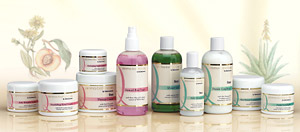7 Effective Antibacterial Essential Oils
 Essential oils have a lengthy history of use as antibacterial medicines, and increasingly researchers are finding evidence that validates their claimed therapeutic properties when used in aromatherapy. This is not surprising when you consider that many essential oils contain around 100 or more therapeutically active ingredients.
Essential oils have a lengthy history of use as antibacterial medicines, and increasingly researchers are finding evidence that validates their claimed therapeutic properties when used in aromatherapy. This is not surprising when you consider that many essential oils contain around 100 or more therapeutically active ingredients.
A typical essential oil will contain an elaborate mixture of aromatic components such as alcohols, aldehydes, esters, ketones, lactones, phenols, terpenes and sesquiterpenes that combine to produce a unique set of therapeutic qualities. And these properties have been shown to be particularly helpful in the fight against infection.
7 Effective Antibacterial Essential Oils:
Cinnamon Leaf
This essential oil is contains around 80 per cent phenols and is well-known for its antibacterial, antiviral, antifungal, and immune-boosting properties. It holds great protective powers that can be used to protect against colds, flu, and the spread of airborne bacteria.
To use cinnamon essential oil as a protective inhalation, fill a bowl with almost boiling water and add three or four drops of the oil. Close your eyes, lean over the bowl and breathe slowly. For the best results, place a large towel over your head and ensure it surrounds the bowl.
You can use cinnamon leaf with other antibacterial essential oils in an aromatherapy cream or base lotion for protective skin treatments, but if you choose to use this oil on its own, use half the normal concentration since it can irritate skin.
Niaouli
Way back in 1976, French researchers discovered that vapourised niaouli essential oil was effective against bacteria such as Staphylococcus, Streptococcus and Proteus. The test results showed that within as little as three hours almost 85 per cent of the microbes were killed (Chir Dent Fr, Sept 9 1976; 46: [319] 53). Niaouli essential oil has also been shown to be effective against candida albicans, herpes simplex, viral hepatitis, influenza and in fact most types of infectious respiratory ailments. This makes it a highly useful oil to use throughout the winter months in an aromatherapy diffuser or a steam inhalation.
Coriander
Researchers at the University of Beira Interior in Portugal tested coriander oil against 12 different strains of bacteria, including Escherichia coli, Salmonella enterica, Bacillus cereus and meticillin-resistant Staphylococcus aureus (MRSA). They discovered that most of the bacteria tested were either killed, or showed reduced growth using a concentration of only1.6% or less of coriander essential oil.
Coriander essential oil achieves this impressive result by damaging the membrane surrounding the bacterial cell, and this action disrupts the barrier between the cell and its environment. This action inhibits important developmental processes of the bacteria, thereby leading to its death.
Lemongrass
Researchers have found lemongrass to be an incredibly effective antibacterial oil, especially against drug resistant organisms. Indeed, experts think lemongrass could be helpful in treating infections caused by multidrug resistant organisms. For treating skin infections, mix four to five drops of lemongrass essential oil with 10ml of carrier oil or base lotion and massage gently into the affected area.
Tea Tree
Well known as an antibacterial and antifungal, this essential oil is applied to the skin after appropriate dilution to treat infected wounds or skin eruptions such as boils and acne. In an emergency 1 or 2 drops of neat tea tree essential oil can be applied to a wound to protect from infection until suitable treatment can be sought.
Researchers from the University of Wolverhampton found that mixing tea tree oil and silver nitrate or adding them to liposomes as a delivery system increased their antimicrobial activity further. When treating problem skin conditions and infections simply add four or five drops of tea tree essential oil to 10ml of carrier oil or aromatherapy base lotion.
Basil
Basil essential oil has been found to be effective when used to treat standard gram-negative bacteria including Escherichia coli, Pseudomonas aeruginosa, and gram-positive ones including Bacillus cereus and Staphylococcus aureus. Add four to five drops of basil essential oil to 10ml of carrier oil or base lotion when applying to the skin.
Lemon Eucalyptus
All species of eucalyptus leaves have been used in traditional Aboriginal bush medicine for thousands of years to speed up the healing of cuts, skin conditions, wounds and infections. Infusions made of E. citriodora leaves were taken internally to reduce fevers and ease gastric conditions, and respiratory infections, colds and sinus congestion were treated by inhaling the vapours of steamed leaves.
In 2007, the antibacterial activity of lemon eucalyptus oil (Eucalyptus citriodora) oil was tested against a battery of clinically important bacterial strains at the Phytochemical Pharmacological and Microbiological Laboratory in India. The oil was found to be highly active against Alcaligenes fecalis and Proteus mirabilis, and active against Staphylococcus aureus, Escherichia coli, Proteus vulgaris, Salmonella typhimurium, Enterobacter aerogenes, Pseudomonas testosterone, Bacillus cereus, Citrobacter freundii.

































